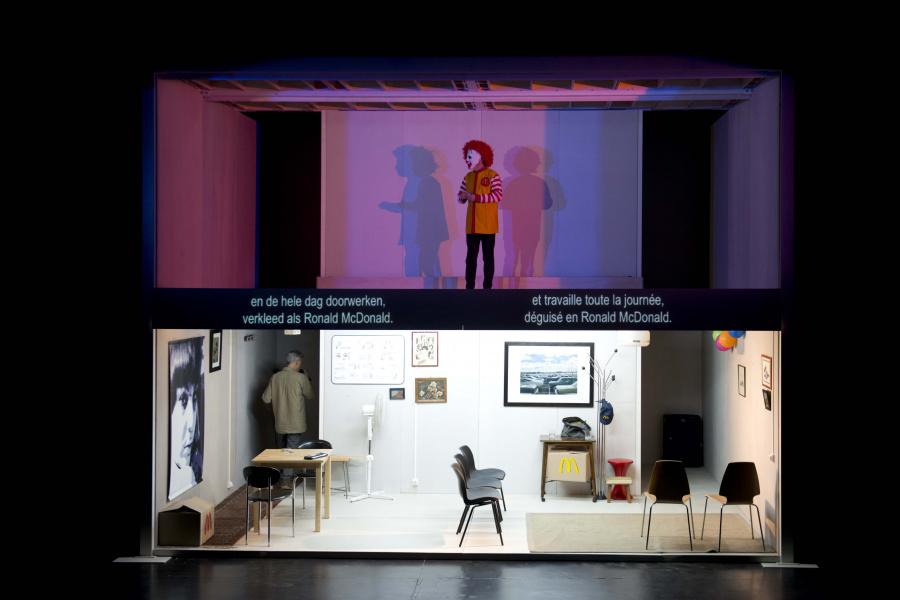 Holland Festival
Holland Festival
In 'Cineastas', the Argentine director shows Mariano Pensotti (1972) a multi-layered story about four Buenos Aires filmmakers, each struggling with their new films. It is partly a portrait of the city, through the eyes of four Argentine filmmakers, says Pensotti. "But it is above all - forgive that foul phrase - a universal story, about the constant interplay between timeless fiction and fleeting, everyday life. How fantasy shapes reality, and vice versa."
Pensotti interweaves four separate stories into a theatrical collage. Underground filmmaker Lucas works at McDonalds - "I'm dying here among the chips and burgers" -, and fantasises about a hyper-aggressive kidnap film, with which he will once and for all kick off the despicable big business, embodied in the form of the hated clown Ronald McDonald. Award-winner Gabriel learns he is terminally ill. He conceals his condition but inscribes his illness into his film, while the popular Mexican protagonist gets it on with Gabriel's wife. Documentary filmmaker Mariela, after the collapse of her loveless marriage, plunges into the revolutionary, hyper-optimistic musicals of the disintegrating Soviet Union. And filmmaker Nadia, totally overwhelmed by the unexpected success of her earlier work and in the midst of a crisis, goes in her film in search of her father - once "disappeared" during the Vidéla regime.
In 'Cineastas', these four films take on a life of their own, dragging their makers with them. Reality and film intertwine until both the films and their makers are fundamentally altered. This makes for two hours of very clever theatre, but it is watchable.
The five actors move through a house-high two-storey peep-show decor created by Mariana Tirantte. On the ground floor, we see the characters' daily grind, and how they tangle with themselves and others. Upstairs, the (fantasised) scenes from their films are played out. Like a horizontal split-screen.
Every actor (except for one, who is exclusively lugging props) is responsible for several roles, or does a narrative voiceover through a wireless microphone while the action on both floors just rolls on. As does the surtitles for the non-Spanish-speaking audience. The only gripes are the likeable, loose acting (Marcelo Subiotto in particular is brilliant in all his roles with beautifully dosed facial expressions) and the at times hilarious text - which is also very strong in the Dutch translation.
Pensotti: "All these characters are deep in existential crisis, but I deliberately sought a light, playful style of acting for contrast. Quite unobtrusive, and organic. I think that has to do with my background, because I had film training. Then, in directing, you tend a bit more towards smaller, more naturalistic acting."
To actually film the film scenes, and project them on the top wall during the performance was too much of a stretch, says Pensotti. "I expressly did not want to use video in this piece. I think that's a weakness. On the contrary, I wanted to keep everything on stage fleeting, because it is a performance about film; a medium that captures time. That contrast is very important."
'Cineastas' is the most complex thing I have ever made for theatre. Not only was it a hefty task to find the theatricality in my original text - actually written as a novella. It was heartbreaking to have to cut into that text. But the seven-month rehearsal process was also intense. Only at the premiere did I really feel that everything was falling into place. Now it's a matter of fine-tuning."
And yes, Pensotti and consorts took a moment to celebrate the recent death of ex-dictator Jorge Vidéla. "In the dressing room, we all had a good glass of whisky. I was born under the dictatorship, and it left deep grooves in our country. But at 10, it was over. I am forty now. So yes, the effects of that inky black period still work through, but it is no longer so all-consuming, both in the arts and in Argentine society. We still have to move on."

